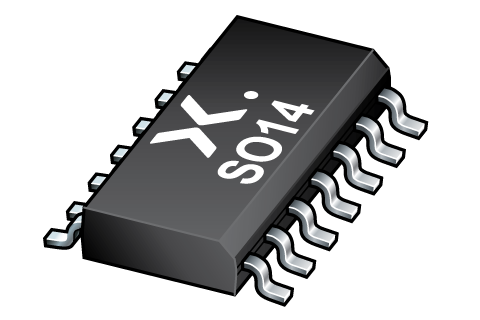
Register once, drag and drop ECAD models into your CAD tool and speed up your design.
Click here for more informationN74F132D
Quad 2-input NAND Schmitt trigger
The 74F132 is a quad 2-input NAND gate with Schmitt trigger inputs.
Features and benefits
- Supply voltage range from 4.5 V to 5.5 V
- Schmitt trigger inputs
- Direct interface with TTL levels
- N74F132 is specified from 0 °C to 70 °C
- I74F132 is specified from -40 °C to 85 °C
Applications
参数类型
| 型号 | Package name |
|---|---|
| N74F132D | SO14 |
封装
下表中的所有产品型号均已停产 。
| 型号 | 可订购的器件编号,(订购码(12NC)) | 状态 | 标示 | 封装 | 外形图 | 回流焊/波峰焊 | 包装 |
|---|---|---|---|---|---|---|---|
| N74F132D | N74F132D,602 (933739440602) |
Obsolete | 74F132D Standard Procedure Standard Procedure |

SO14 (SOT108-1) |
SOT108-1 |
SO-SOJ-REFLOW
SO-SOJ-WAVE WAVE_BG-BD-1 |
暂无信息 |
| N74F132D,623 (933739440623) |
Obsolete | 74F132D Standard Procedure Standard Procedure | 暂无信息 |
文档 (9)
| 文件名称 | 标题 | 类型 | 日期 |
|---|---|---|---|
| 74F132 | Quad 2-input NAND Schmitt trigger | Data sheet | 1991-06-25 |
| AN90063 | Questions about package outline drawings | Application note | 2025-03-12 |
| SOT108-1 | 3D model for products with SOT108-1 package | Design support | 2020-01-22 |
| Nexperia_package_poster | Nexperia package poster | Leaflet | 2020-05-15 |
| SO14_SOT108-1_mk | plastic, small outline package; 14 leads; 1.27 mm pitch; 8.65 mm x 3.9 mm x 1.75 mm body | Marcom graphics | 2017-01-28 |
| SOT108-1 | plastic, small outline package; 14 leads; 1.27 mm pitch; 8.65 mm x 3.9 mm x 1.75 mm body | Package information | 2023-11-07 |
| SO-SOJ-REFLOW | Footprint for reflow soldering | Reflow soldering | 2009-10-08 |
| SO-SOJ-WAVE | Footprint for wave soldering | Wave soldering | 2009-10-08 |
| WAVE_BG-BD-1 | Wave soldering profile | Wave soldering | 2021-09-08 |
Longevity
The Nexperia Longevity Program is aimed to provide our customers information from time to time about the expected time that our products can be ordered. The NLP is reviewed and updated regularly by our Executive Management Team. View our longevity program here.
模型
| 文件名称 | 标题 | 类型 | 日期 |
|---|---|---|---|
| SOT108-1 | 3D model for products with SOT108-1 package | Design support | 2020-01-22 |
How does it work?
The interactive datasheets are based on the Nexperia MOSFET precision electrothermal models. With our interactive datasheets you can simply specify your own conditions interactively. Start by changing the values of the conditions. You can do this by using the sliders in the condition fields. By dragging the sliders you will see how the MOSFET will perform at the new conditions set.